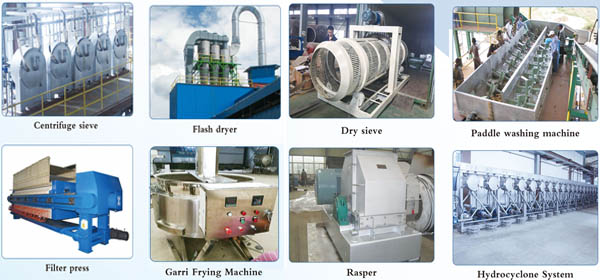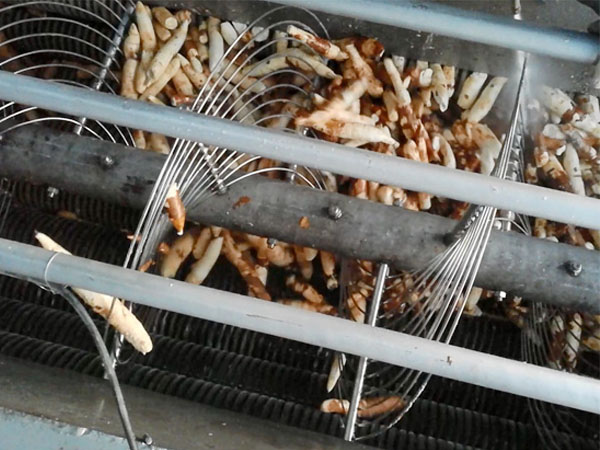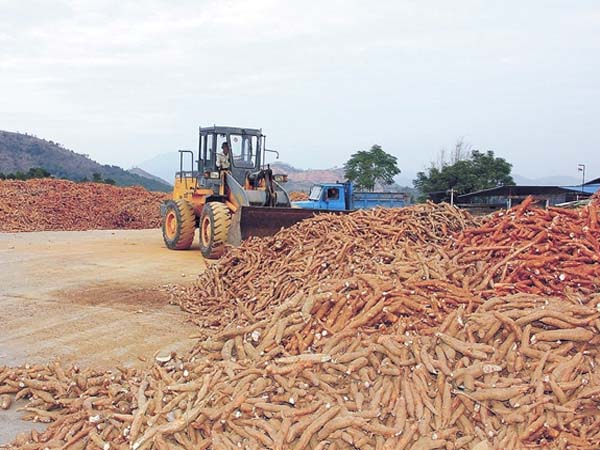Start the commerical cassava processing in Africa is very important
In the processing of cassava, African cassava products have always been relatively less competitive in the world market, because the production and processing of African cassava is mainly for survival, not for commercial use. Currently, major cassava producing countries in Africa have recognized the need to develop technologies to grow, harvest and process cassava to increase productivity and reduce post-harvest losses.
In 2010-2017, the global cassava processing market has a compound annual growth rate of approximately 2.1%, and the 2017 production reached approximately 284.9 million tons. Most of the populations in Africa, Latin America and Asia depend on cassava for their livelihoods because cassava provides food and business opportunities for farmers and traders. Thus, start the commerical cassava processing in Africa is very important, because this can fully using this rich cassava material to get higher profit and improve the life level.
 Main cassava processing machines from Doing Company
Main cassava processing machines from Doing Company
In terms of cassava production, Africa is the world's largest cassava producing area, accounting for nearly 55% of the world's cassava production. However, Africa's unit cassava production is also lower in the world, only 10 tons per hectare. Low productivity is the result of limited market opportunities due to mechanization and low utilization of production or processing tools. Statistics show that African farmers need 10 days to remove or harvest their fields, while Indian farmers only need 6 hours. In the processing of cassava, African cassava products have always been relatively less competitive in the world market, because the production and processing of cassava in Africa is mainly for survival, not for commercial use.
Currently, major cassava producing countries in Africa have recognized the need to develop technologies to grow, harvest and process cassava to increase productivity and reduce post-harvest losses. In some parts of Africa, cassava accounts for more than 50% of people's daily diet. Among all African countries, Nigeria's cassava production ranks first, accounting for about one-fifth of the world's cassava production. It produces about 45 million tons of cassava annually. Cassava is easy to grow in arid areas with very limited rainfall, and Nigerian farmers choose cassava for their production because of their stubborn viability in the drought.
 Cassava processing
Cassava processing
It is estimated that by 2020, Nigerian cassava production will double, but currently 90% of cassava is consumed in Nigeria. However, high-quality cassava has prompted them to establish some cassava starch industry. At present, Nigeria's high-quality cassava starch industry is mainly small-scale, and the end users of cassava starch include Nestle, Nigerian flour mill and Cadbury. Traditionally, cassava is one of the main foods of Nigerian farmers, and it is also widely consumed in his African countries. Cassava roots are used to make different types of local foods such as starch, ethanol, cassava flour and garry.
Nigerians say that if they commercialize cassava, cassava may even replace the status of oil, which will promote their economy and create jobs. However, in fact, the current industrialization and commercialization of the cassava industry in Nigeria is seriously inadequate. At present, the annual national demand for cassava starch in Nigeria is estimated at 350,000 tons, while the national supply is estimated to be about 300,000 tons. According to the Chinese-African trade research, the cassava starch is an important product of cassava processing. The cassava root is washed and beaten, and then the wet slurry is squeezed to extract the liquid for drying. The cassava starch will remain after the water is removed from the wet slurry. This starch is then used in the food, paper, textile industry, and mineral wool and clay industries.
 Cassava collection and processing
Cassava collection and processing
In order to promote the industrialization of the cassava industry, Nigeria has launched a government initiative that “containing at least 10% of cassava flour in bread” has achieved great success. Importantly, the policy of adding 10% cassava flour to bread and its sweets has made the cassava industry a “gold mine” that employs millions of Nigerians to provide income for farmers and a large number of processors. A direct consequence of the policy of introducing 10% cassava in bread is the Nigerian flour processing company's need to increase 300,000 tons of high quality cassava powder per year. If the potential of cassava is properly released, the cassava industry may be more likely to help Nigeria's industrialization than any other industry. It is in recognition of this fact that the Nigerian government has given priority to the cultivation, processing and export of cassava in the past few years, which has led to the birth of cassava leather in Nigeria.
Cassava is an important root crop in Nigeria. In Nigeria, just cassava accounts for about 45% of Nigeria's agricultural GDP, mainly for food or household use, but its industrial processing and utilization is very limited. At present, Nigeria produces about 45 million tons of cassava. Since the state government wants to reduce import dependence and save scarce foreign exchange, a national program aims to increase the production of cassava starch to replace corn starch. Nigeria's demand for cassava starch is high, and the driving force behind this demand is the policy of the government to replace corn starch with cassava starch.






